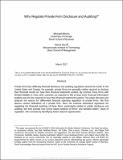Why regulate private firm disclosure and auditing?
Author(s)
Minnis, Michael; Shroff, Nemit
DownloadShroff_JN_2017_WhyRegulatePrivateFirms.pdf (487.5Kb)
OPEN_ACCESS_POLICY
Open Access Policy
Creative Commons Attribution-Noncommercial-Share Alike
Terms of use
Metadata
Show full item recordAbstract
Private firms face differing financial disclosure and auditing regulations around the world. In the US and Canada, for example, private firms are generally neither required to disclose their financial results nor have their financial statements audited. By contrast, many firms with limited liability in most other countries are required to file at least some financial information publicly and are also required to have their financial statements audited. This paper discusses and analyzes the reasons for differential financial reporting regulation of private firms. We first discuss various definitions of a private firm. Next, we examine theoretical arguments for regulating the financial reporting of these firms, particularly related to public disclosure and auditing. We then provide new survey-based evidence of firms’ and standard setters’ views of regulation. We conclude by identifying future research opportunities.
Date issued
2017-06Department
Sloan School of ManagementJournal
Accounting and Business Research
Publisher
Informa UK Limited
Citation
Minnis, Michael, and Nemit Shroff. “Why Regulate Private Firm Disclosure and Auditing?” Accounting and Business Research 47, no. 5 (June 8, 2017): 473–502.
Version: Author's final manuscript
ISSN
0001-4788
2159-4260